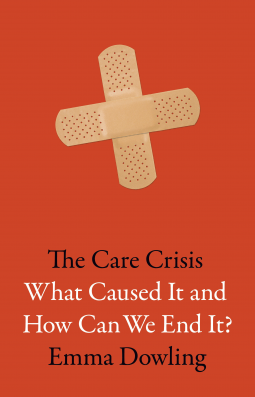
The Care Crisis
What Caused It and How Can We End It?
by Emma Dowling
This title was previously available on NetGalley and is now archived.
Send NetGalley books directly to your Kindle or Kindle app
1
To read on a Kindle or Kindle app, please add kindle@netgalley.com as an approved email address to receive files in your Amazon account. Click here for step-by-step instructions.
2
Also find your Kindle email address within your Amazon account, and enter it here.
Pub Date Jan 26 2021 | Archive Date Jan 26 2021
Verso Books (US) | Verso
Talking about this book? Use #TheCareCrisis #NetGalley. More hashtag tips!
Description
Valuing care and care work does not simply mean attributing care work more monetary value. To really achieve change, we must go further.
In this groundbreaking book, Emma Dowling charts the multi-faceted nature of care in the modern world, from the mantras of self-care and what they tell us about our anxieties, to the state of the social care system. She examines the relations of power that play profitability and care off in against one another in a myriad of ways, exposing the devastating impact of financialisation and austerity.
As the world becomes seemingly more uncaring, the calls for people to be more compassionate and empathetic towards one another—in short, to care more—become ever-more vocal. The Care Crisis challenges the idea that people ever stopped caring, but also that the deep and multi-faceted crises of our time will be solved by a simply (re)instilling the virtues of empathy. There is no easy fix.
The Care Crisis enquires into the ways in which the continued off-loading of the cost of care onto the shoulders of underpaid and unpaid realms of society, untangling how this off-loading combines with commodification, marketisation and financialisation to produce the mess we are living in. The Care Crisis charts the current experiments in short-term fixes to the care crisis that are taking place within Britain, with austerity as the backdrop. It maps the economy of abandonment, raising the question: to whom care is afforded? And what would it mean to seriously value care?
Available Editions
| EDITION | Other Format |
| ISBN | 9781786630346 |
| PRICE | $26.95 (USD) |
| PAGES | 272 |
Featured Reviews
This was an interesting analysis of a system which is failing and has, arguably, always been so. By examining the economic considerations of the caring function, the author manages to remove the emotion which can distort the capacity for rational analysis. I don’t think the analysis really reached a conclusion and maybe that’s okay - these are complex issues - but it certainly makes you think.
 Reviewer 721928
Reviewer 721928
I've read so many books on the care crisis, so I appreciated how of the moment Dowling's book feels. It's very much focused on the pandemic, even if her work significantly predates it. While The Care Crisis addresses a broad spectrum of care (child care, eldercare, etc) the focus is limited to the UK, which prevents the topic from becoming completely overwhelming.
Dowling connects the threads of familiar topics: the gig economy and zero-hour contracts, hedge funds, and austerity to demonstrate how, exactly, we got here and what's needed to improve the situation. This is a serious book of social economics, not a guide to "parenting your parents" or a feel good book on "the hardest job I've ever loved." Dowling goes far beyond a simple separate spheres argument bemoaning the commodification of the family, the thinly disguised anti-feminist argument that remains so popular. She demonstrates that when care is presented as a luxury good, it's easy to foster a situation where many are forced to go without.
This is a wonderful introduction to the topic for someone interested in the economics of care. Dowling presents a broad array of ideas and introduces readers to a wide variety of sources, making this an excellent starting point for further research.


















